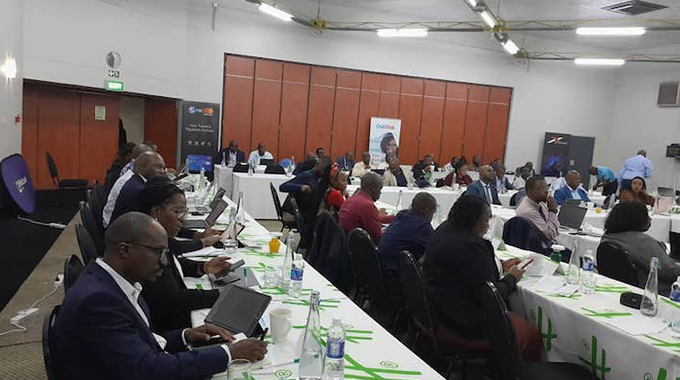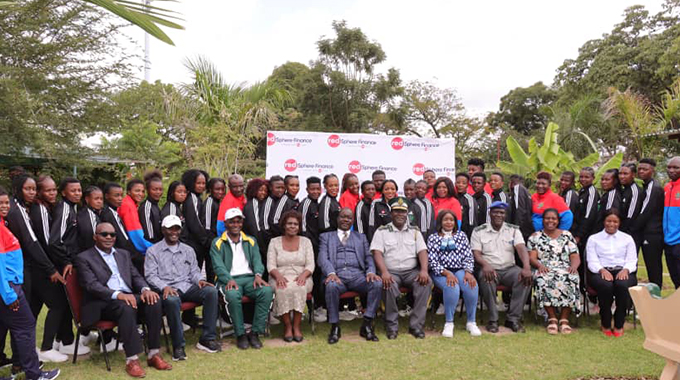Ex-soldier with a passion for the ‘golden leaf’

Patrick Chitumba, Midlands Bureau Chief
AFTER he was hired on two consecutive seasons to transport tobacco bales from Kwekwe to Harare auction floors and, seeing farmers being paid huge amounts of money for deliveries, Kwekwe-based tobacco farmer, Mr Solomon Nhondova developed passion for the “golden leaf”.
The former soldier who retired with the rank of Warrant Officer Class 1 after serving in the Zimbabwe National Army (ZNA) for 23 years, said seeing tobacco farmers being rewarded with high returns made him jump at the opportunity to grow the crop and also make money.
The 2023 tobacco selling season officially opened yesterday in a development that is expected to boost the country’s foreign currency earnings.
An estimated 8,5 percent growth in tobacco output of 230 million kilogrammes is expected this year, compared to 212 million kilogrammes last year.

Mr Solomon Nhondova showing his health tobacco
The trend is seen as a reflection of increased interest by small and large-scale growers in venturing into the capital-intensive, but viable tobacco-growing industry.
The Tobacco Industry and Marketing Board (TIMB) is anticipating increased business activities during this year’s marketing season.
“I was a soldier with ZNA for 23 years and after I retired I bought a truck and started farming at a plot along Kwekwe-Gokwe road and that was around 2005. By that time, I was busy growing maize and I thought I had made it in life since I could buy food and generally look after my family,” he said.
Mr Nhondova who is a widower, said around 2006, he moved from the plot along Kwekwe-Gokwe road to Plot 30 Bonstead Farm Sherwood Kwekwe where his life changed for the better.
He said around 2011, some tobacco farmers from his area started hiring his truck to ferry their crops to Harare tobacco auction floors.
“The first year, I saw the farmers being paid hard cash and it was a lot of money. I drove back with them and they did a lot of things with their money to uplift their livelihoods,” said Mr Nhondova.
He said in 2012 the same farmer hired him for another trip to Harare with their tobacco.
“Again they were paid huge amounts of money and in cash. I was smitten by what I was seeing at the auction floors as the farmers who hired me received cash payments. On my way back I told myself that the following year, that was 2013, I was going to start tobacco farming,” said Mr Nhondova.
In 2013, he cleared three hectares of land and embarked on a new journey of growing tobacco and since then, Mr Nhondova as never looked back.

Mr Solomon Nhondova showing his health tobacco crop at his Sherwood ploty
He managed to buy and install two water pumps, and a drip irrigation system and fenced his plot using proceeds from tobacco farming.
Mr Nhondova is also a proud owner of 34 cattle through tobacco farming.
“So it’s been 10 years of growing tobacco and I am glad I ventured into this crop which has high returns. I managed to construct a house at the plot, bought other cars, and also installed drip irrigation on three hectares,” he said.
Mr Nhondova said he also constructed two tobacco curing barns at his plot and plans to put in a third one.
The barn is for flue-curing and is usually small and tightly constructed with ventilators and metal pipes extending from under the floor of the barn.
Tobacco is flue-cured to provide temperature and humidity conditions that will encourage certain desirable chemical and biological changes and preserve the leaf and retain quality through timely drying.
“I have two barns for the three ha and I want to add more barns as soon as I get paid. I have 30 ha of land and it is my goal to utilise all of it, mainly doing tobacco,” said Mr Nhondova.
Tobacco is also one of Zimbabwe’s top foreign-currency earners, accounting for about 12 percent of the nation’s economic output.
In 2018, tobacco production reached 252 million kilogrammes, the highest in Zimbabwe’s 121-year history of commercial growing, according to TIMB.
The crop provides the highest economic return for each hectare among all the major annual crops grown in the country, says the association.
Tobacco curing involves a series of physical and chemical changes that begin when the plant is cut until it is dried and that it takes up to eight weeks to complete the process.
Mr Nhondova had to employ workers to assist him with planting, harvesting, curing, and taking the crop to tobacco auction floors in Harare.












Comments